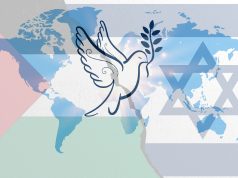.
By Rachel Avraham
On September 17, 2022, Dr. Uri Milstein and Zvi Messinai discussed Messinai’s demographic research on the subject of Israeli people migrating from the ancient State of Israel to Afghanistan 2000 years ago. Messinai claims that in order to bypass the anti-Semitism and anti-Zionism that Israel suffers from, an explanatory revolution about the history of Israeli people instead of the history of the Jewish people should start.
The division of the Jewish people was documented in the days of Jeroboam and Rehoboam, when the people of Israel were divided into the Kingdom of Judah and the kingdom of Israel 2900 years ago. The division grew after the destruction of the First Temple which led to the exile of the Kingdom of Israel and the rise of the Ten Lost Tribes. As a result, the ten tribes continued their wanderings and distanced themselves from the religion of Moses and Israel. Messinai claims that the offspring of the ten tribes are living today in Israel (Including among the Palestinians), in Afghanistan and even in parts of Pakistan, China and Japan..
Messinai says that the area of Afghanistan and Pakistan, in which the ethnic groups known as the Balochs and the Pashtuns live, many are the descendants of the ten tribes of Israel. The Balochs are THE offspring of the Dan tribe and half of the Menashe tribe. Even without checking the number of descendants of the Israelites who live in Afghanistan, one can see the Israeli connection to the name of the country Afghanistan. “Afghanistan” is a distortion of the pronunciation of the original name, which is “Efranistan”, which has a distinct and clear resemblance to the name of the Israeli tribe “Efraim”. This is why Zvi Messinai claims that Afghanistan was the seat of the Ephraim tribe after the exile.
According to Massini, the Alewi minority in Syria from which Bashar al-Assad comes, is also a descendant of the tribes of Israel. But not only the Alewis are the descendants of the Israeli tribes in Syria, but also a considerable part of the Sunnis who oppose Bashar al-Assad are also. From Homs to the Iraqi border lives the “Anza” tribe, whose origin according to Messinai is from refugees who fled from the Jewish kingdom of Khyber in the Arabian Peninsula (today Saudi Arabia) about 1000 years ago. Those Jewish refugees converted to Islam in order to stop the Muslim persecution.
The descendants of the Jews in the Anza tribe count about 12 million people who are spread as far as Iraq and the Persian Gulf, mainly in Dubai and Qatar. Messinai claims that all Arab leaders from Kuwait to the Saudi royal family are Jewish or Israeli in origin. In addition to the Anza tribe and the Alewis, there is also Kurds in Syria that have Jewish origin. They came from the Labani tribe in Afghanistan. The name Labani apparently originates from the name Levi.
Iraq was a country with an especially large Jewish minority, which at its peak reached ten million souls. Today, part of the Babylon Judaism descendants did not continue to be Jews, and live in Iraq and Iran mainly. Excluding the Kurds from Iraq but not the Assyrians who still remain there, the descendants of the converted Jews are more than half of the residents of Iraq. Iran is one of the greatest enemies of the State of Israel, a country that publicly threatens Israel on a regular basis, yet 28 – 30 million of its residents are descendants of martyred Jews. Messinai claims that these details are verified through a Mossad agent who dealt with the matter.
Jordan has a Palestinian majority and a Bedouin minority (70% Palestinians). Messinai claims that the Palestinian majority in Jordan also consists of descendants of Israel, but not all of them. On the other hand, the Bedouin mostly came from Saudi Arabia and among them there is a lot of the seed of Israel. The tribe of Bnei Sakhar is probably Bnei Issachar, or for example the Hawitat tribe, a respectable Bedouin tribe from which the former commander of the Jordanian Air Force emerged, whose father, according to rumors, had tefillin. Many of the Bedouins who came from Saudi Arabia actually left the Land of Israel for Saudi Arabia and returned to the same area, so that some of the Bedouins in the State of Israel are also descendants of Israel.
In the whole world, there are 400 million Israeli descendants, but in the territorial sequence of the descendants of Israel in the Middle East (Israel, Jordan, Syria, Iraq, Iran, Afghanistan and even Pakistan) live 100 million people whose origin is from the Israel. Mesinai’s claims that the State of Israel should start an explanatory struggle to win over the hearts and minds of those nations who are the descendants of Israel, in order for them to realize that they are originally Israelites. It might make them be more reconciled towards Israel. The explanatory struggle should start with the Palestinians, explaining to them about their true identity and bring them closer to it and maybe this will curb the hatred of Jews.
After the Palestinians, Israel should engage in outreach with the rest of the nations descended from the Lost Tribes.
By connecting all the tribes of Israel once again, it might be possible to increase the nation of Israel from the small and persecuted nation that it was throughout history into a large and strong nation that does not need to fear recurring threats. In Zvi Messinai’s vision, he sees the “Israeli Commonwealth”, that includes all the Israelites reuniting together after the destruction of the First Temple.





